
Digital marketing is the use of digital channels, such as search engines, social media, email, and websites, to reach and connect with potential customers.
Digital marketing apps can help businesses to automate tasks, streamline workflows, and track results, making it easier and more efficient to run digital marketing campaigns.
Why are apps important for digital marketing?
Digital marketing apps can help businesses in a number of ways, including:
- Automating tasks: Digital marketing apps can automate many repetitive tasks, such as scheduling social media posts, sending email newsletters, and tracking website traffic. This can free up time for marketers to focus on more strategic initiatives.
- Streamlining workflows: Digital marketing apps can help to streamline workflows by providing a central platform for managing all aspects of digital marketing campaigns. This can improve efficiency and reduce the risk of errors.
- Tracking results: Digital marketing apps can help businesses to track the results of their campaigns in real time. This data can then be used to optimize campaigns and improve performance.
What are the top digital marketing trends for 2023?
Some of the top digital marketing trends for 2023 include:
1. Social media marketing: Social media marketing is still one of the most effective ways to reach and engage with potential customers. In 2023, businesses will need to focus on creating high-quality content that is relevant to their target audience.
2. Content marketing: Content marketing is another important digital marketing strategy. In 2023, businesses will need to focus on creating informative and engaging content that helps them to build relationships with potential customers.
3. Email marketing: Email marketing is still a very effective way to reach and convert potential customers. Businesses will need to focus on personalizing their email campaigns and segmenting their email lists to ensure that they are sending the right message to the right people.
4. Analytics and reporting: It is important for businesses to track the results of their digital marketing campaigns in order to optimize them and improve performance. It will need to focus on using analytics and reporting tools to track their progress and make informed decisions about their marketing strategies.
Who should use these apps?
Digital marketing apps can be used by businesses of all sizes, from small businesses to large enterprises. They can also be used by individuals who are self-employed or who are looking to start their own business.
Social media marketing apps
Social media marketing apps can help businesses to manage their social media accounts, schedule posts, track engagement, and analyze results.
Some of the most popular social media marketing apps include:
Hootsuite
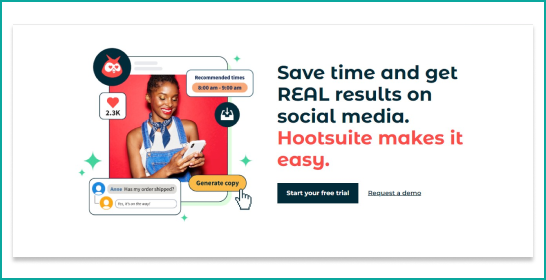
Hootsuite is a social media management platform that allows you to manage multiple social media accounts from a single dashboard.
You can schedule posts, track engagement, and analyze results. Hootsuite also offers a variety of features for social listening and team collaboration.
Pros:
- Comprehensive social media management platform
- Allows you to manage multiple social media accounts from a single dashboard
- Offers a variety of features for scheduling posts, tracking engagement, and analyzing results
- Offers social listening and team collaboration features
Cons:
- Can be expensive for small businesses
- Can be complex to use for beginners
How to use Hootsuite:
- Create an account and add your social media accounts.
- Use the Composer to create and schedule posts.
- Use the Streams tab to monitor your social media activity and respond to messages.
- Use the Analytics tab to track your social media performance.
Pricing:
Professional – $49/Month
Team – $99/Month
Business – $249/Month
Enterprise – Contact for pricing
Buffer
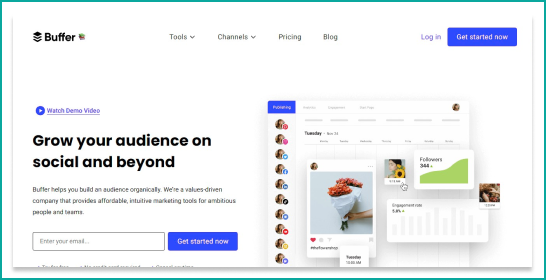
Buffer is a social media management platform that helps businesses and individuals schedule, publish, and analyze their social media posts. It supports a wide range of social media platforms, including Twitter, Facebook, Instagram, LinkedIn, Pinterest, and TikTok.
Pros:
- Easy to use
- Affordable pricing
- Offers a variety of features for scheduling posts and tracking engagement
Cons:
- Doesn’t offer as many features as some other social media management platforms, such as Hootsuite
- Not as well-suited for businesses that need to manage multiple social media accounts
How Buffer works:
- Create a Buffer account and connect your social media accounts.
- Create and schedule your social media posts.
- Buffer will publish your posts at the scheduled times.
- Track your social media performance with Buffer’s analytics.
Pricing:
Lifetime Free
Pro – $15/Month
Premium – $65/Month
Business – $99/Month
Sprout Social
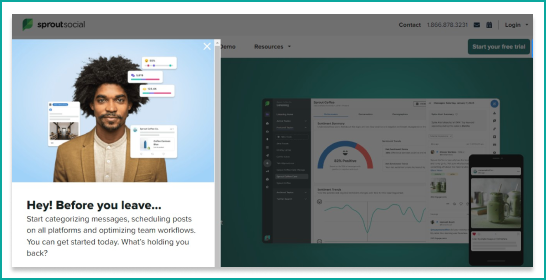
Sprout Social is a unified social media management platform that helps businesses of all sizes manage their social media presence, engage with their audiences, and measure the impact of their social media campaigns.
Sprout Social is a powerful and versatile social media management platform that can be used by businesses of all sizes to improve their social media marketing results.
Pros:
- Offers a variety of features for social media management, social listening, analytics, and reporting
- Good choice for businesses that need more advanced social media management tools
Cons:
- Can be expensive for small businesses
- Can be complex to use for beginners
Pricing:
Standard – $249/Year
Professional – $399/Year
Advanced – $499/Year
Enterprise – Contact for Custom pricing
Facebook Pages Manager
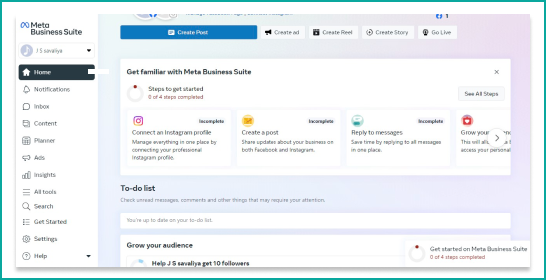
Facebook Pages Manager is a free app that allows businesses to manage their Facebook pages from their mobile devices. It is available for both iOS and Android devices.
Facebook Pages Manager is a great tool for businesses of all sizes, but it is especially useful for businesses that do not have a dedicated social media manager. It is also a good tool for businesses that need to manage multiple Facebook pages.
With Facebook Pages Manager, you can:
- Create and publish posts
- Respond to messages and comments
- View insights about your page’s performance
- Manage your page’s settings
- And more!
Pros:
- Easy to use
- Allows you to manage your Facebook pages from a single app
Cons:
- Doesn’t offer as many features as some other social media management platforms, such as Hootsuite
- Not as well-suited for businesses that need to manage multiple social media accounts
Pricing:
Free for Lifetime
Instagram Business Suite
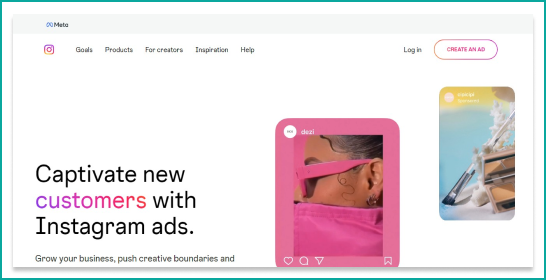
Instagram Business Suite is a free suite of tools that helps businesses manage their Instagram accounts. It includes a variety of features, such as post scheduling, analytics, and insights.
It also allows businesses to connect their Facebook and Instagram accounts, so they can manage both platforms from a single dashboard.
Pros:
- Manage multiple social media accounts in one place.
- Schedule posts and stories in advance.
- Get insights into your audience and performance.
- Free to use.
- Easy to use
Cons:
- Doesn’t offer as many features as some other social media management platforms, such as Hootsuite
- Some features are only available to paid users.
- Limited functionality for stories.
- Can be buggy.
- Not as well-suited for businesses that need to manage multiple social media accounts
Pricing:
Free Forever
Content marketing apps
Content marketing apps can help businesses to create and manage content, such as blog posts, articles, and social media posts.
Some of the most popular content marketing apps include:
Canva
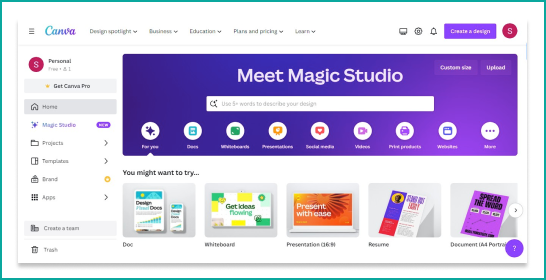
Canva is a free online graphic design platform that allows users to create visually appealing content without any design experience. Canva offers a variety of templates and tools for creating social media graphics, blog posts, presentations, and other types of content.
It is easy to use, even for beginners. Users simply select a template and then add their own text, images, and other elements. Canva also offers a variety of tutorials and resources to help users learn how to use the platform.
Canva is a popular choice for businesses of all sizes, as well as for individuals who need to create visually appealing content for their personal or professional use.
Pros:
- Easy to use, even for beginners
- Offers a wide variety of templates and tools for creating visually appealing content
- Affordable pricing
- Collaboration
Cons:
- Free plan has limited features
- Doesn’t offer as many advanced features as some other graphic design software
Pricing:
Pro – $9.99 per month or $99.99 per year
Teams – $14.99 per user per month or $149.99 per user per year
Free version is also available with variety of features.
Grammarly
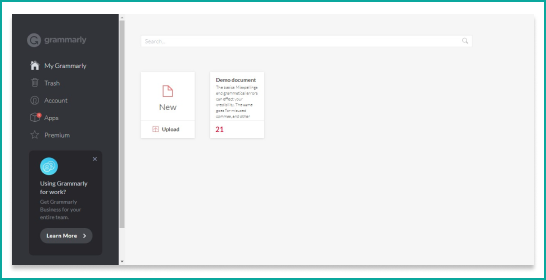
Grammarly is a cloud-based writing assistant that helps users improve their writing by identifying and correcting grammar, spelling, and punctuation errors, as well as suggesting stylistic improvements.
It is one of the most popular writing assistants available, and is used by students, professionals, and writers of all levels.
Pros:
- Comprehensive grammar and spelling check
- Real-time feedback
- Suggestions for improving your writing style
- Plagiarism checker
- Easy to use
Cons:
- Free plan has limited features
- Not 100% accurate
- Suggestions may not be appropriate for all contexts
- Can be expensive
- Can be addictive
Pricing:
Free use
Premium – $30/Month
Business – $25 per user
BuzzSumo
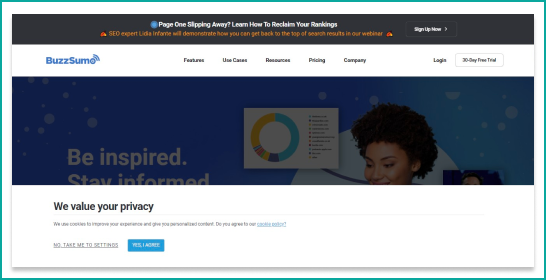
BuzzSumo is a content marketing platform that helps businesses find and analyze popular content.
It allows users to search for topics, keywords, and domains to see what content is most popular on social media and other websites.
It also provides insights into who is sharing the content, what types of content are most popular, and when the content was published.
Pros:
- Comprehensive content research
- Influencer marketing tools
- Competitive analysis
- Easy to use
- Provides insights into popular content and trending topics
- Helps you to identify influencers in your industry
Cons:
- Can be expensive for small businesses
- Pricing
- Limited social media coverage
- Limited backlink metrics
Semrush
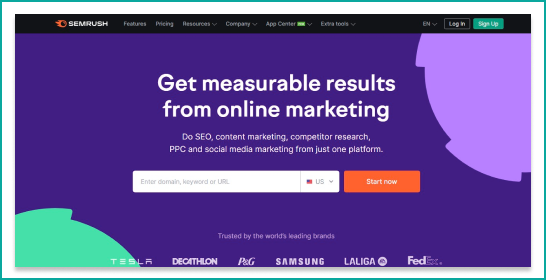
Semrush is a leading digital marketing platform that offers a suite of tools to help businesses of all sizes improve their online visibility and performance. Its tools cover a wide range of digital marketing disciplines, including SEO, PPC advertising, social media marketing, and content marketing.
Whether you’re just starting out with digital marketing or you’re a seasoned pro, Semrush can help you to take your online presence to the next level.
It tools are easy to use and provide valuable insights that can help you to improve your search rankings, increase website traffic, and generate more leads and sales.
If you’re serious about digital marketing, Semrush is a must-have tool.
Pros:
- Comprehensive SEO and content marketing toolset
- Accurate and reliable data
- Generous usage allowances
- Offers a variety of tools for keyword research, content optimization, and competitor analysis
- Excellent customer support
Cons:
- Can be expensive
- Learning curve
- Data can be inaccurate
- Only covers GoogleTraffic data is not always accurate
- UI can be a bit cluttered
Pricing:
Content Creation – $199/month
PR & Comms – $299/month
Suite – $499/month
Enterprise – $999/month
Email marketing apps
Email marketing apps can help businesses to create and send email newsletters, manage email lists, and track email performance. Some of the most popular email marketing apps include:
Mailchimp
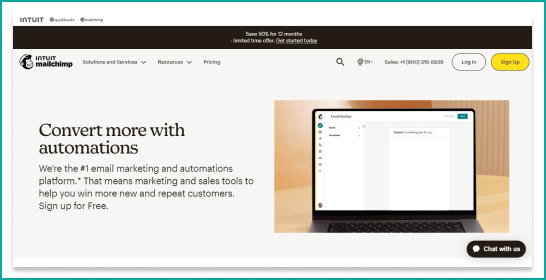
Mailchimp is an all-in-one marketing platform that helps businesses of all sizes manage and talk to their customers, clients, and other interested parties. It offers a wide range of features for creating and sending email newsletters, managing email lists, tracking email performance, and more.
Mailchimp is known for its user-friendly interface and its affordable pricing. It also offers a free plan for businesses with up to 2,000 subscribers and 12,000 emails per month.
Pros:
- Free plan
- Easy to use
- Wide range of features
- Integrations with a variety of other marketing platforms
- Good customer support
- Offers a variety of features for creating and sending email newsletters, managing email lists, and tracking email performance
Cons:
- Limited email sends with every plan
- Not all templates are available with the free plan
- The free plan includes Mailchimp branding
- Not the most cost-effective for businesses with large contact lists
- Free plan has limited features
Pricing:
Free Forever
Essentials Plan – Starting at $9 per month
Standard Plan – Starting at $15 per month
Premium Plan – Starting at $299 per month
Constant Contact
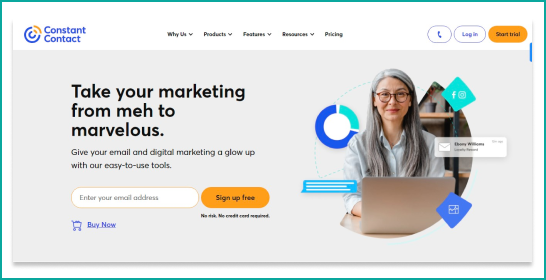
Constant Contact is an email marketing and marketing automation platform designed for small businesses and organizations. It offers a variety of features to help businesses create and send email newsletters, manage email lists, track email performance, and automate marketing campaigns.
It is a good choice for businesses of all sizes, but it is especially well-suited for small businesses that are just starting out with email marketing. It is easy to use and offers a variety of affordable pricing options.
Pros:
- Offers a variety of features for creating and sending email newsletters, managing email lists, and tracking email performance
- Good choice for businesses that need more advanced email marketing tools
Cons:
- Can be expensive for small businesses
- Can be complex to use for beginners
Pricing:
Lite – Starting at $12/month
Standard – Starting at $35/month
Premiun – Starting at $80/month
ConvertKit
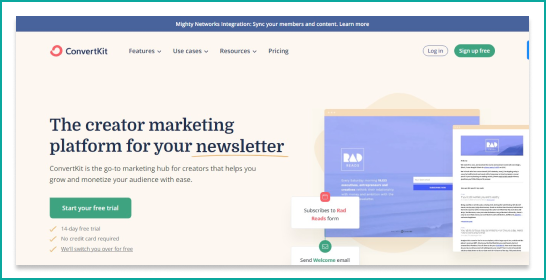
ConvertKit is an email marketing platform designed specifically for creators, such as bloggers, podcasters, and YouTubers. It offers a variety of features to help creators build and manage their email lists, send targeted email newsletters, and sell digital products.
One of the key features of ConvertKit is its focus on segmentation. Creators can segment their email lists based on a variety of factors, such as interests, purchase history, and engagement. This allows them to send more targeted and relevant emails to their subscribers.
ConvertKit also offers a variety of automation features. Creators can create automated email sequences that are triggered by specific events, such as subscribing to a list or purchasing a product. This can save creators a lot of time and help them to stay in touch with their subscribers.
In addition to its email marketing features, ConvertKit also offers a number of tools to help creators sell digital products. Creators can create landing pages, sell products directly from their ConvertKit accounts, and track sales data.
Pros:
- Easy to use and navigate interface
- Powerful automation builder
- Comprehensive segmentation and tagging features
- Wide range of integrations with other marketing tools
- Excellent customer support
- Designed for creators, such as bloggers, podcasters, and YouTubers
Cons:
- Pricing can be expensive, especially for larger subscriber lists
- Limited email template options
- No built-in landing page builder
Key benefits:
- Segmentation
- Automation
- Digital product sales
Pricing:
Free plan with limited features
Paid plans starting at $29 per month
Analytics and reporting apps
Analytics and reporting apps can help businesses to track the results of their digital marketing campaigns in real time. Some of the most popular analytics and reporting apps include:
Google Analytics
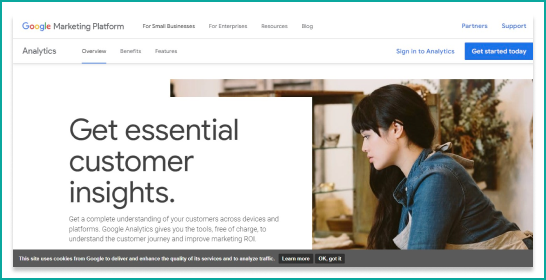
Google Analytics is a web analytics platform that provides businesses with insights into their website traffic and visitor behavior. It is a free service that is easy to set up and use.
It collects data about your website visitors, such as the pages they visit, the time they spend on your website, and the devices they are using. This data can be used to track a variety of metrics, including page views, unique visitors, bounce rate, and conversion rate.
It also offers a variety of features for reporting and analysis. You can use Google Analytics to create custom reports, track trends over time, and compare your website performance to other websites.
How to Use Google Analytics
To use Google Analytics, you will need to create an account and add a tracking code to your website. Once you have done this, Google Analytics will start collecting data about your website visitors.
You can access your Google Analytics data by logging into your account. From there, you can view a variety of reports about your website traffic and visitor behavior.
Google Analytics offers a variety of resources to help you learn how to use the platform. You can find these resources on the Google Analytics website.
Pros:
- Free to use
- Website traffic tracking
- Custom reporting
- Provides comprehensive insights into website traffic and visitor behavior
- Understand your website visitors
- Track your website performance
Cons:
- Can be complex to analyze for beginners
- Can be overwhelming
- Requires some technical knowledge
- Data sampling
- Doesn’t offer as much data as some other web analytics platforms
Adobe Analytics
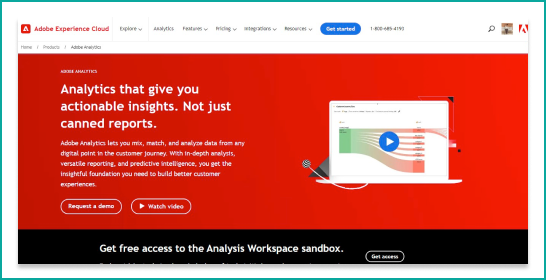
Adobe Analytics is a web analytics platform that provides businesses with insights into their website traffic and visitor behavior.
It can be used to track a variety of metrics, including page views, unique visitors, bounce rate, conversion rates, and more. Adobe Analytics also offers a variety of features for segmenting and analyzing data, as well as for creating custom reports.
Adobe Analytics is a powerful tool that can be used to improve website performance, drive traffic, and increase conversions. It is used by businesses of all sizes, from small businesses to large enterprises.
Pros:
- Offers a variety of advanced features for web analytics, such as advanced segmentation, predictive analytics, and reporting
- Good choice for businesses that need more advanced web analytics tools
- Advanced segmentation
- Machine learning and AI
- Optimize your marketing campaigns
- Cross-channel analytics
- Integration with other Adobe products
Cons:
- Can be expensive, especially for larger businesses
- Can be complex to use and implement, especially for beginners
- Some users have reported technical support issues
Pricing:
Contact for Pricing Details
Mixpanel
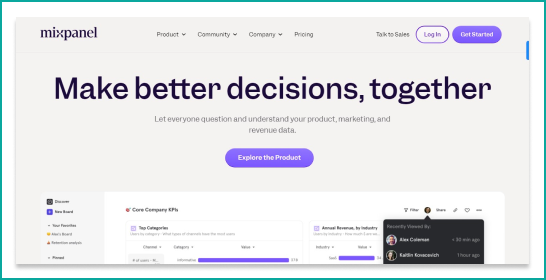
Mixpanel is a product analytics platform that helps businesses track and analyze user behavior. It provides a wide range of features, including event tracking, funnels, segmentation, and retention analysis.
It can be used to track user behavior on websites, mobile apps, and other digital products.
It is a powerful tool that can help businesses understand how users are interacting with their products and make informed decisions about how to improve them. It is used by a wide range of businesses, from small startups to large enterprises.
Pros:
- Powerful segmentation capabilities
- Real-time data
- Funnel analysis
- A/B Testing
- Variety of features for tracking user engagement and behavior in products
Cons:
- Complex learning curve
- Limited customizability
- Can be expensive for beginners
Pricing:
Lifetime Free with 20M events per month
Growth – $20 per month and includes 300M events per month
Enterprise – $833 per month and includes 1B events per month
Other digital marketing apps for Ads
In addition to the apps listed above, there are a number of other digital marketing apps to run ads that can be helpful for businesses. Some of these apps include:
- Google Ads
- Facebook Ads
- LinkedIn Ads
- Twitter Ads
There are a variety of digital marketing apps available, each with its own unique features and benefits. The best digital marketing apps for you will depend on your specific needs and budget.
Conclusion
Digital marketing is essential for businesses of all sizes in today’s digital world. By using digital marketing channels, businesses can reach a wider audience, build relationships with potential customers, and generate more leads and sales.
However, digital marketing can be complex and time-consuming. That’s where digital marketing course can help. A digital marketing course can teach you the skills and knowledge you need to create and manage effective digital marketing campaigns.
Our digital marketing course will cover a wide range of topics, including:
- SEO
- PPC advertising
- Social media marketing
- Content marketing
- Email marketing
- Analytics and reporting
A digital marketing course can be a great way to learn the skills you need to start your own digital marketing career or to improve your digital marketing skills in your current job.
If you’re interested in learning more about digital marketing, sign up for a digital marketing course today! There are many different courses available, so you can find one that fits your needs and budget.


